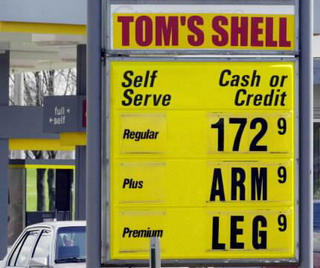 Although some disagree, gas are prices on the rise with no real relief in sight. Consequently, alternative methods of transportation have been getting a lot more attention. Frankly I’m not terribly inconvenienced -- and far from panicked -- because I only have a motorcycle and even though it doesn’t get 100 mi/gal or go 260 mph it still gets me where I want to go more economically than most cars -– except maybe these.
Although some disagree, gas are prices on the rise with no real relief in sight. Consequently, alternative methods of transportation have been getting a lot more attention. Frankly I’m not terribly inconvenienced -- and far from panicked -- because I only have a motorcycle and even though it doesn’t get 100 mi/gal or go 260 mph it still gets me where I want to go more economically than most cars -– except maybe these.Still though, for small jaunts around town I generally take my bike. Bikes are great things. They are vastly more efficient than walking and they go by burning calories off of you rather than oil from some well in the Middle East. But that doesn’t mean that people aren’t trying to improve them by adding small engines or other things. Even without power assist I can often make it to where I’m going without a significant time penalty over driving, especially when traffic is bad.
Cars though are here to stay unless we have some sort of a nation-wide mass-transportation renaissance. Urban planning in the Midwest has been centered around the single-family, two-car household for the better part of the last century has led to sprawling subdivisions and complete stratification of residential, commercial, and industrial zoning. So we have to make the best of it like the folks over at Subaru. A lot of credit for the hybrid revolution has to be given to the Japanese who seem determined to get every last mile out a gallon. However domestic hybrids seem to focus on only getting meodicher mileage out of larger vehicles. Ford does have some other thing going for them though. Their newer vehicles can seemingly stand toe-to-toe with imports in many regards. I was aghast when Click and Clack suggested that an expecting family look into getting a Ford 500 rather than a Honda CRV -- their regular fall-back recommendation for this type of purchase. A Ford over a Honda? What’s going on here?
So, cars are here to stay for the foreseeable future -- at least in non-metropolitan areas. But what if they had more of the advantages of motorcycles? With a bit of work you could get a motorcycle to power a car in a number of different ways. While I most likely won’t be able to pursue either of those options I may end up buying a car here pretty soon.
2 comments:
No advertisements in this comment!
Ah, yes, the car is an interesting subject as it pertains to my current job. See, the refugees that we get need to be placed in a job, but before that happens, they need a way to get to their job. Unfortunately, the cheap apartments where they live are typically on the edge of town, and not very close to the factories or hotels where most are hired. To add to the problem, the bus service is inadequate, not running on nights or weekends, meaning many jobs are unavailable due to the hours they require. So it's a vicious cycle - in order to get a car, you need work, and in order to work, you need a car, or at least a friend with a car, which most refugees also don't have. Would that public transportation be better in this city...
ok now the links work. a pitty they didn't before.
Post a Comment